AI/ML
Help one of the largest brands in the world improve and launch their new online sales training program for Apple Geniuses world-wide.
Artificial Intelligence (AI) and Machine Learning (ML)
Artificial Intelligence (AI) and Machine Learning (ML) represent ground breaking frontiers in technology, enabling systems to learn from data, adapt, and perform tasks traditionally requiring human intelligence. AI involves the creation of intelligent agents capable of mimicking cognitive functions, while ML focuses on developing algorithms that allow machines to learn patterns and make predictions. As these technologies continue to advance, their applications span various sectors, from automating routine tasks and enhancing decision-making processes to revolutionizing industries with innovative solutions. The evolving landscape of AI and ML promises to reshape how we interact with technology, solve complex problems, and usher in a new era of intelligent automation and data-driven insights.
AI and ML use cases
1) A Speech-to-Text model for a mobile app with automatic speech recognition for teaching children to read.
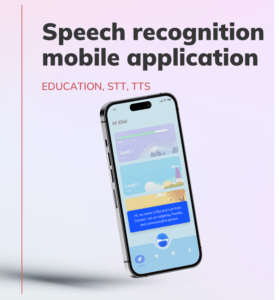
Since the app had to control children’s pronunciation, we needed to implement algorithms for both directions that would provide high-precision results. Existing solutions were not applicable, so we researched both available data sources and probable approaches to meet model restrictions.
Our team collected and augmented intensive data sources; designed custom architectures; implemented the solution, and tested it. We integrated several sound transfer techniques for speech pattern reconstruction and created clusterization algorithms for data segmentation and further analysis.
Technologies and tools: TensorFlow, Keras, PyTorch, PyAudio, Hugging Face, Scipy, Numpy, Pandas, Cython, C/C++, KALDI, VOSK, Silero-models, Redis, MongoDB, Docker, Docker Compose, PostgreSQL, Kafka, AWS (S3, Sagemaker, Studio, Pipelines, Experiments), Comet, Optuna.
2) A simple and affordable ML-powered asthma management tool that helps both physicians and patients with asthma.
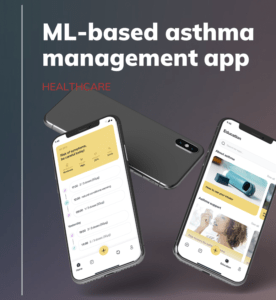
The project goal was to create an app that would help patients manage their disease in an intuitive way. Also, the app provides data for physicians to evaluate the patient’s state and adjust treatment.
Our team developed the app’s functionality and ML algorithms. Users can let the exclusively taught ML algorithm listen to how they use inhalers. After the audio is processed by the algorithm, it evaluates the way the inhaler is used and gives a short summary to the user. Also, users can see the risk of asthma symptoms based on the evaluation of various triggers like weather, humidity, etc. The dashboard shows weekly statistics about user conditions including inhales users take, triggers they face, etc.
Technologies and tools: Python, Dart, Flutter, Django, PostgreSQL, Scikit-learn, Pandas, BorutaPy, Hyperopt, Plotly, AWS (S3, EC2, Redshift, Sagemaker, Glue), Redis, Docker, Docker Compose
3) DSaaS to forecast materials shipment terms and reduce customer churn rate.
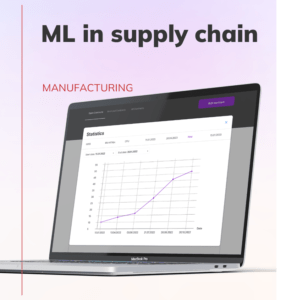
MW2 Talent has developed a DS and MLOps web extension to predict supplies and prevent delivery delays.
Simply put, the solution’s flow can be described in the following way. Users input all the data regarding specific vendors like contracts’ IDs, required materials, order/delivery dates, current progress, and any auxiliary information. Then, based on the ML in supply chain algorithms, the platform analyzes indicated data and predicts procurement dates, considering the history of previous interactions, vendor reliability, and external risks.
Technologies and tools: TypeScript, Node.js, Nest, TypeORM, React, Next.JS, MobX, MUI, Tensorflow, Keras, PyTorch, Scikit-learn, MLFlow, Pandas, Matplotlib, Plotly, Numpy, PostgreSQL, AQA, Manual.
4) We have developed a smart chatbot that improves sales and customer satisfaction by tailoring product recommendations.

The chatbot acts as an assistant, guiding customers to desired products and providing insights based on user preferences.
Utilizing the RLHF (Reinforcement Learning from Human Feedback) approach, it refines recommen- dations over time, resulting in a 12% increase in upsells, a 25% boost in average sales per visit, and an 81% positive feedback score. The recommen- dation engine employs LLMS (Large Language Model Supervision) for processing customer queries and offering product insights.
Technologies and tools: Python, HuggingFace, AWS(EC2, ECR, S3, Codebuild, Cloudwatch, SageMaker), GPT-4, LlaMa, LoRa, Flask, Tensorflow, PineCone, Git, Docker, React, Langchain, MongoDB, PostgresDB, CUDA, mlxtend.
5) Voice recognition helps customers to find out the price of the insurance object faster and makes the evaluation process easier.

To determine the price, a user needs to name aloud the required parameters (object’s brand, production year, etc.). The application analyzes the voice information and displays an image of the object on the screen. When a user confirms that the object is chosen correctly, the system analyzes the data and shows the approximate insurance price of the object. To confirm the final cost, an insurance company manager calls the user to determine details.
The intelligence recognition solution helps reduce the workload of managers, as well as increasing customer loyalty through the use of advanced technology.
Technologies and tools: Python, Tensorflow, Keras, SpeechRecognition, Hugging Face, NLTK, PyAudio, Scipy, Numpy, Pandas, AWS (S3, Sagemaker, Studio).
6) The web platform allows analysing and predicting the behaviour of visitors.
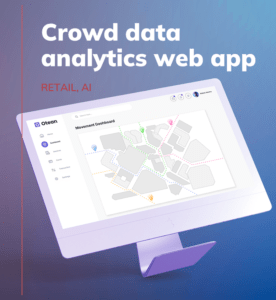
The solution helps offline stores and places gain data on the number of visitors, their paths, time spent, etc. This information helps retailers gain a clear understanding of typical visitor behavior, evaluate business performance, develop new marketing strategies, and make informed decisions.
The web application captures anonymized Wi-Fi signals from visitors’ smartphones and uses MAC addresses of devices to fulfill its core functions. Also, the solution is enriched with unique technologies, including Artificial Intelligence and Machine Learning. Thus, offline businesses get access to analytical data, comparable to the e-commerce sphere.
Technologies and tools: Python, Pyramid, Cornice, PostgreSQL, Postgis, SQLAlchemy, Alembic, Requests, Redis, RQ, AioHTTP, RabbitMQ, Pandas, Kafka, Swagger API, Docker, Pytest, FactoryBoy, JavaScript, Kubernetes
7) Custom solution for an eCommerce company designed to analyze and predict demand and sales based on data.
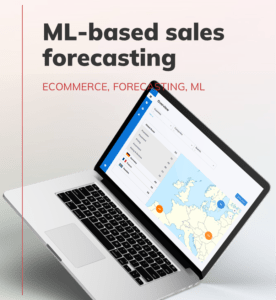
Our goal was to use data engineering and AI to predict product trends. The solution collects data from major e-commerce platforms such as Amazon, eBay, Walmart and Aliexpress, and uses Parse, the largest commerce performance analytics platform. Web scraping and API calls were used to extract and process product search and purchase data.
Using time-series forecasting techniques and ML tools such as collaborative filtering and ranking algorithms, we optimised inventory levels by predicting demand for specific products and adjusted marketing strategies to target the most promising customer segments, resulting in increased sales.
Technologies and tools: Python, BeautifulSoup, SQLAlchemy, Power BI, Superset, ARIMA, Lightfm, LightGBM, RankLib, Prophet, Statsmodels, AWS
8) Solution for preventing scraping attacks .

The client is a popular brand who sells clothes, shoes, etc. mainly online. The customer wanted to protect against scrapping attacks by competitors.
We found the main problem in Professional Commercial Data Collectors using scraping, masking and trailing techniques. Our solution consisted of two main components.
- Rate limit. We implemented specialized anti-bot systems which simplifies the management of multiple limits across different URLs and types of clients. Such systems allow limiting requests per minute, per session, and per session duration.
- Classification based on machine learning and statistical methods. The use of statistical methods allows for identifying patterns in traffic and in client behavior. Our system is capable of detecting users who make more requests than usual.
Technologies and tools: Java, сustom ML system (based on Java and Spring), AWS (S3, EC2, IAM)
9) The app provides vocal training for both children and adults, utilizing intelligent recommendations for effective learning.
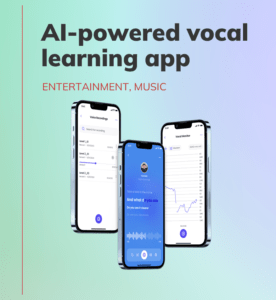
We have created an AI-powered app allowing users to practice their vocal skills and get feedback and individual suggestions for future training.
The app with integrated voice recognition analyzes the user’s singing to determine areas for improve- ment. When processing each individual reference sample, the AI-based system breaks the sample down for two processing levels: audio correlation system and phoneme evaluation model. The audio correlation system identifies speech characteristics such as pitch, tone, rhythm, and timbre, and compares them to human samples. The evaluation model conducts a precise phoneme comparison, detecting difficulties at specific moments and suggesting additional exercises.
Technologies and tools:
Python, TensorFlow, Keras, SpeechRecognition, NLTK, PyAudio; SwiftUI, Kotlin; CI/CD: Bitbucket pipelines.
10) AI-based call center software for a big telecom company that connects operators and clients within a unified system.
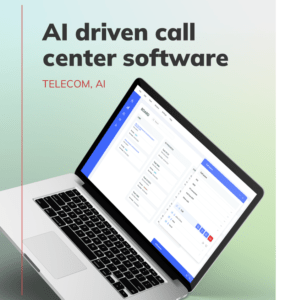
MW2 Talent has forged a robust AI-based call center automation software that processes calls from clients through AI-automated voice recognition and request identification.
QA was directly involved in the training and validation of ML algorithms, executing full end-to-end custom script testing and automation. We provided the main test coverage at the API level.
To ensure error-free functioning, we simulated a load of up to 7000 calls per minute. During performance testing, our QA engineers ramped up the load to peak values, checking for defeated requests and timeouts.
QA technologies and tools: Appium, Apptim, Grafana, Influx DB, Firebase Performance Monitoring, XCTest with measure Blocks, Jetpack Macrobenchmark, Locust, AWS, Prometheus
11) Revolutionizing Ecommerce with AI-Driven Personalization and Chatbot Integration
Client Overview:
Facing challenges with outdated recommendation systems and limited customer support capabilities, the Client (North America based D2C retailer) partnered with MW2 Consulting to implement AI solutions.
Challenges:
- Limited Personalization:
- The Client struggled with generic product recommendations, resulting in reduced user engagement and missed sales opportunities.
- Inefficient Customer Support:
- The absence of a robust chatbot system led to delays in customer query resolution, affecting overall customer satisfaction.
Our Solutions:
- AI-Driven Product Recommendations & Personalization Engine Integration:
- Conducted a detailed Discovery session with stakeholders to gather requirements and document use cases.
- Analyzed the requirements and identified solutions & tools for implementation that meet the requirements.
- Integrated with relevant AI-enabled tools to implement the solution.
- Chatbot Integration:
- Implemented an AI-driven chatbot to provide instant and personalized customer support.
- Trained the chatbot to understand and respond to customer queries, process orders, and provide product recommendations, enhancing the overall customer experience.
Benefits and Results:
- Increased Conversion Rates:
- The AI-driven product recommendation engine resulted in a 25% increase in click-through rates and a 15% boost in overall conversion rates.
- Enhanced Customer Engagement:
- Personalization led to a 30% increase in time spent on the website, indicating higher engagement and a more satisfying shopping experience.
- Improved Customer Support Efficiency:
- The AI chatbot reduced response times by 40%, leading to faster query resolution and a 20% improvement in customer satisfaction scores.
Cost and Timeline Estimate:
- The project was executed within a few weeks, covering discovery, development, implementation, and training.
Conclusion:
By leveraging AI-enabled tools and solutions, the Client experienced a remarkable transformation in their ecommerce operations. The implementation of personalized recommendations and an efficient chatbot not only addressed existing challenges but also contributed to a significant improvement in customer satisfaction and business performance.
Key Takeaways:
- AI-driven product recommendations enhanced user engagement and conversion rates.
- Personalization features resulted in a more satisfying and tailored shopping experience.
- The integration of an AI chatbot improved customer support efficiency and response times.
By partnering with MW2 Consulting, the client successfully embraced the power of AI, propelling them to the forefront of the ecommerce industry and setting a new standard for personalized customer experiences.
12) Guiding a Client Towards Successful AI Implementation
Overview:
One of our clients in the Technology sector, seeking to harness the power of AI for transformative growth, partnered with MW2 Consulting to navigate the complexities of initiating an AI-based transformation.
Challenges:
- Lack of Direction:
- The Client expressed a desire to integrate AI into their operations but lacked a clear roadmap and understanding of where to begin.
- Data Quality Issues:
- Inconsistent and unclean data hindered the potential success of AI initiatives.
Our Approach:
- Stakeholder Interviews:
- Conducted extensive interviews with key stakeholders to understand their business goals, pain points, and expectations from AI implementation.
- Identification of Use Cases:
- Collaborated closely with the client to identify use cases aligned with their strategic objectives and areas where AI could drive tangible business value.
- Prioritizing “Low Hanging Fruit” Solutions:
- Strategically recommended starting with smaller, manageable AI projects that could demonstrate quick wins and build confidence within the organization.
- Identified use cases
- Data Cleanup Consultation:
- Worked closely with the client’s IT team to assess existing data quality and structure.
- Provided guidance on data cleanup and optimization strategies to ensure high-quality inputs for AI algorithms.
Implemented Solutions:
- Pilot AI Projects:
- Initiated small-scale AI projects in targeted areas identified during stakeholder interviews, ensuring minimal disruption to existing workflows.
- Enhanced Customer Segmentation:
- Implemented AI-driven customer segmentation to personalize marketing efforts, resulting in a 15% increase in customer engagement.
- Process Automation:
- Introduced AI-based automation for routine tasks, reducing operational costs by 20% and freeing up resources for more strategic initiatives.
Results:
- Successful Pilot Projects:
- Demonstrated the viability of AI solutions through successful completion of initial projects, building confidence among the client’s leadership and teams.
- Tangible Business Impact:
- The implemented solutions resulted in measurable improvements, including increased customer engagement and operational cost savings.
- Improved Data Quality:
- Collaborated with the Client’s IT Team to establish data governance practices, leading to improved data quality and reliability for future AI initiatives.
Conclusion:
Through a strategic partnership, MW2 Consulting empowered the Client to embark on their AI journey, starting with small, impactful projects. By aligning AI initiatives with business goals, addressing data quality issues, and delivering successful pilot projects, we set the foundation for the Client to scale their AI-based transformation with confidence.
Key Takeaways:
- Collaborative stakeholder engagement is essential for identifying meaningful AI use cases.
- Starting with “low hanging fruit” projects allows for quick wins and builds organizational confidence.
- Data cleanup and optimization are crucial for the success of AI initiatives.
The success of the Client’s initial AI projects positioned them for further innovation and growth, marking the beginning of a successful AI-enabled transformation.